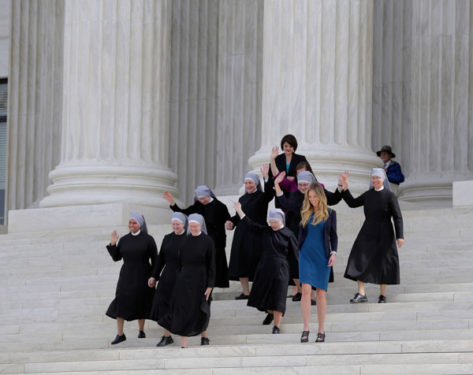
By Christopher White
The Tablet National Correspondent
The Trump administration announced Oct. 6 that it is ending the requirement for employers to provide birth control coverage in their health insurance plans if it violates “sincerely held religious beliefs.”
Widely known as the HHS contraceptive mandate, the requirement from the Department of Health and Human Services, was one of the most controversial elements of the Affordable Care Act passed by Congress in 2010.
The new mandate, issued on Friday, will allow religious groups and charities to be exempt while maintaining the existing federal contraceptive mandate for most employers.
“The United States has a long history of providing conscience protections in the regulation of health care for entities and individuals with objections based on religious beliefs and moral convictions,” the administration said in the new rule.
The United States Conference of Catholic Bishops (USCCB) released a statement on Friday hailing the decision as “good news for all Americans.”
In a joint statement, Cardinal Daniel DiNardo, Archbishop of Galveston-Houston and President of the USCCB, and Archbishop William E. Lori of Baltimore, Chairman of the USCCB’s Ad Hoc Committee for Religious Liberty, said the decision is “a return to common sense, long-standing federal practice, and peaceful coexistence between church and state.”
“It corrects an anomalous failure by federal regulators that should never have occurred and should never be repeated,” said the bishops.
The Little Sisters of the Poor have been among the most visible litigants against the federal government whose lawsuit was heard by the Supreme Court in May 2016.
The Court ruled that the government could not fine the Little Sisters for refusing to comply with the mandate.
On May 4, after a year of waiting for clarity on a new rule, President Trump signed an executive order on religious freedom, meant to end the standoff between religious groups over the Obama Administration’s HHS contraception mandate.
“We will not allow people of faith to be targeted, bullied or silenced anymore,” said the president.
Over the past five months, religious freedom advocates have pressured the administration to provide formal relief rather than verbal assurances of it. The decision on Friday appears to be the first step in that direction.
In response to the new rule, Mark Rienzi, senior counsel at Becket and lead attorney for the Little Sisters of the Poor said “HHS has issued a balanced rule that respects all sides – it keeps the contraceptive mandate in place for most employers and now provides a religious exemption.
“The Little Sisters still need to get final relief in court, which should be easy now that the government admits it broke the law,” Rienzi added.
The decision was also praised by numerous Catholic and pro-life organizations that challenged the mandate.
“For more than five years, the HHS contraception mandate has forced Americans to violate their deeply held moral and ethical principles, without regard for the Constitution’s guarantee of religious liberty,” said Michael Warsaw, CEO of EWTN, a Catholic television and media organization.
“EWTN filed a lawsuit against the government in February 2012, just days after the mandate rules were first published and we have continued to fight for justice alongside many courageous believers. We are encouraged by today’s announcement,” said Warsaw.
Catherine Glenn Foster, President and CEO of Americans United for Life said, “Millions of Americans want no part of an insurance system that subsidizes the destruction of innocent human life, and HHS’s new interim regulation respects that principled stand.”
Yet the decision was also met by criticism from women’s rights groups.
Catholics for Choice, a pro-abortion rights advocacy group, issued a statement saying it was a “purely political decision (and) is not about protecting religious freedom, but about privileging one set of special interests at the expense of women nationwide.”
There is speculation that the new rule will prompt subsequent litigation from organizations who fear the new rule will limit access to birth control coverage.
In a press call on Friday, Rienzi said such fears are unfounded.
“This was always a big, divisive, and unnecessary culture war fight. Simply put, you don’t need nuns to give out contraceptives. They’re widely available,” he said.
Rienzi said the new rule, while an interim one still susceptible to being challenged, was “moderate and balanced.”
“It keeps in place the contraceptive mandate for virtually all employers who are already subject to it,” said Rienzi. “What they did was add a real and true religious exemption…that’s important when people are thinking and talking about the impact of this rule on the availability of contraceptives, because virtually everybody that is already receiving contraceptives from their employer under this mandate will keep receiving.”
